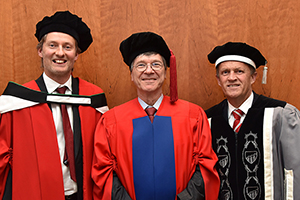Latest News Archive
Please select Category, Year, and then Month to display items
05 May 2023
|
Story EDZANI NEPHALELA
|
Photo Supplied
![]()
This audit process will assess the resources available and required for the implementation of a Language policy framework for higher education (2020) – such as the development of multilingual terminologies, translation services for teaching and learning materials, campus signage, as well as various multimedia collateral – including their quality and relevance to the needs of the students and faculty. The audit will include an assessment of existing resources and whether they are furthering implementation goals, and may also include the gathering of feedback from students and faculty to identify improvement areas.
Dr Nomalungelo Ngubane, Director of the UFS Academy for Multilingualism, said the process will help the UFS identify the essential languages resources that are available for the successful implementation of the 2020 Language Policy for Higher Education framework (LPHE). “The audit will identify how much has been done at the UFS and which institutions we can collaborate with, for example, in the development of Sesotho, so that we do not reinvent the wheel, but we close the gaps.”
Once the audit is completed, the institution will develop a plan for resource allocation to address the identified gaps. This may involve acquiring new resources, upgrading existing ones, or reallocating existing resources better to meet the needs of students, staff, and faculties.
Due to the impact this audit will have on various stakeholders, all staff and students are encouraged to participate. To attend the audit, please RSVP here by 30 May 2023.
Prof Jeffrey Sachs presented with honorary doctorate at Spring Graduation Ceremony
2015-10-01

Prof Jeffrey Sachs (centre) with Prof Philippe Burger,
Head of Department: Economics (left), and
Prof HJ Kroukamp, Dean of the Faculty of Economic and
Management Sciences (right).
Photo: Charl Devenish |
“Quality education is the best accelerator for sustainable growth. Universities have a unique role to play in this regard,” Prof Jeffrey Sachs said during a lecture he presented at the University of the Free State (UFS) Faculty of Economic and Management Sciences. He gave an insightful overview of the new Sustainable Development Goals (SDGs) of the United Nations. The 17 SDGs replace the Millennium Development goals of the past 15 years. In a major achievement, 193 countries will sign the goals at the United Nations (UN) in New York on 25 September 2015.
Prof Sachs is the director of The Earth Institute, Quetelet professor of Sustainable Development, and professor of Health Policy and Management at Columbia University. He is also a special advisor to the UN Secretary-General Ban Ki-moon on the Millennium Development Goals, and director of the UN Sustainable Development Solutions Network. Another accolade now added to his résumé is an honorary doctorate in Economics conferred on him by the UFS at the Spring Graduation Ceremony on 17 September 2015 for outstanding achievements and contribution to academia.
“South Africa is not achieving sustainable development. It has the highest inequality in the world with high unemployment among the youth. Quality education is the best accelerator for growth,” Prof Sachs said. He used the high education investment in Korea as an example of that country’s growth. Prof Sachs added that the government cannot achieve the SDGs on its own. “It is important for the country and universities to take on the goals. Universities can apply pressure, influence and provide solutions.”